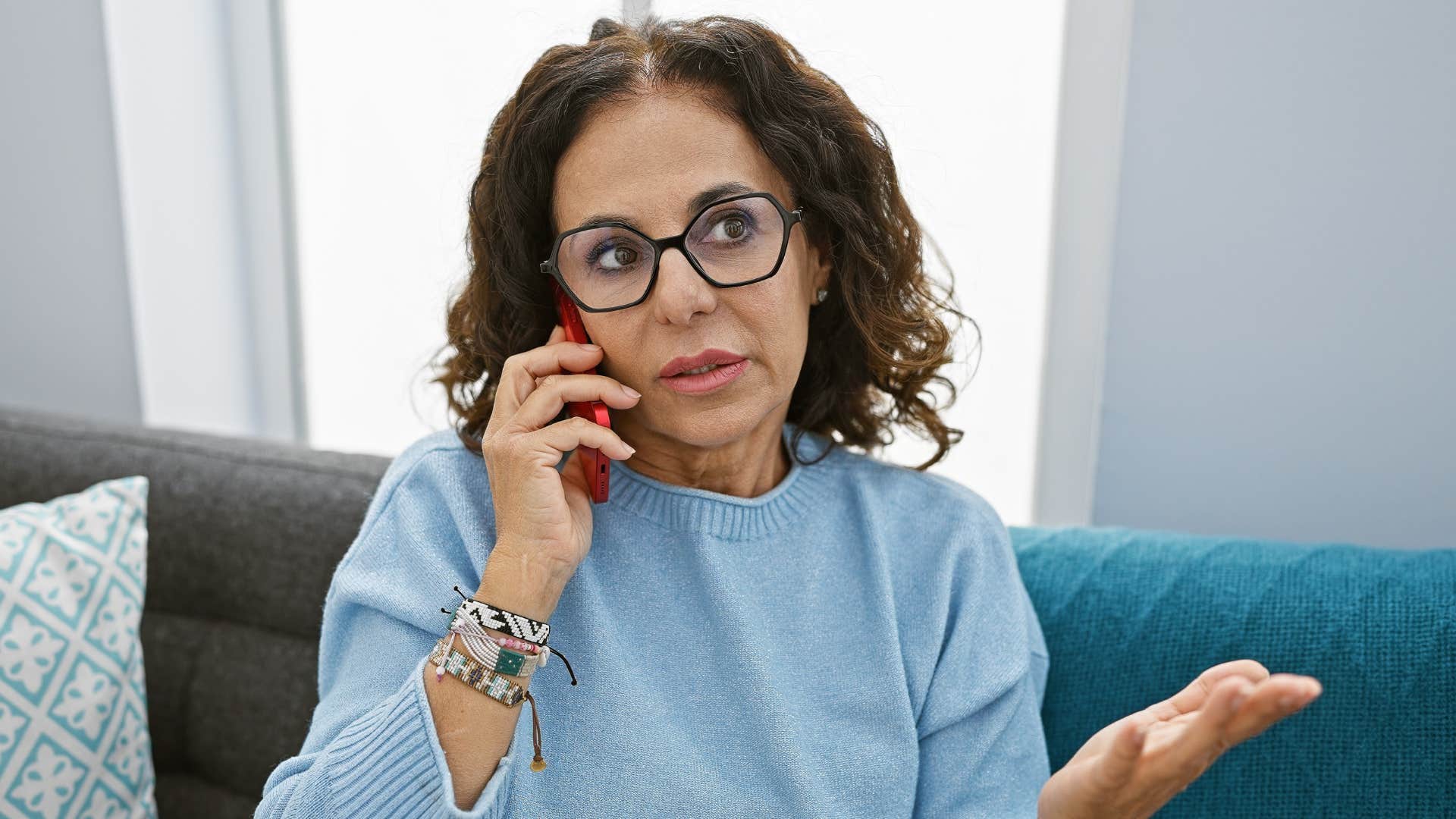11 Phrases That Brilliant People Use Instead Of Saying 'I Don't Know'
Nobody can be an expert at everything, but the most intelligent people go a step further.
 Miljan Zivkovic | Shutterstock
Miljan Zivkovic | Shutterstock Admitting that you don't know something is a natural part of life; in fact, being able to confidently admit that you're not an expert at everything is actually a sign of intelligence and competence that can motivate people towards learning opportunities and new connections. However, if you're using a phrase like "I don't know" to escape accountability or actively avoid the discomfort of "not knowing," that can quickly sabotage your personal development and any ability to make deeper connections with others.
While it may be tempting to lean toward avoidance, try using some of the phrases that brilliant people use instead of saying "I don't know." By using curiosity and collaboration as a jumping point for conflict and problem resolution, rather than discomfort, anxiety, and avoidant tendencies, you set everyone up for success.
Here are 11 phrases that brilliant people use instead of saying 'I don't know'
1. 'Can you tell me more about that?'
 Ground Picture | Shutterstock
Ground Picture | Shutterstock
According to a study published in the Journal of Individual Differences, curiosity is a trait generally linked to intelligence, as it encourages people to open up conversations and seek new experiences that they may not understand or otherwise have the opportunity to engage in.
By asking a question like this, rather than saying "I don't know" when someone asks you for something or brings up a new subject, truly brilliant people have an opportunity to grow. They not only spark a collaborative energy in a fleeting conversation, setting up a foundation for a connection with another person, they have the chance to learn something new.
Even in an already established relationship, many of the phrases that brilliant people use instead of saying "I don't know" allow people to genuinely connect and get vulnerable. They're not avoiding things that they don't understand or that spark moments of discomfort, but seeking them out — addressing conflicts, solving problems, and learning new things with each other.
2. 'Let's try something else'
 Ground Picture | Shutterstock
Ground Picture | Shutterstock
Adopting a different point of view or approach when solving a shared problem is a fundamental tactic of successful problem-solvers, according to a study from the Journal of Pedagogical Research. By using a question like this to get to the root cause of an issue, rather than avoid a conversation completely, brilliant people excel at making personal connections and resolving problems in the workplace.
Whether it's a project in the workplace or building trust in a relationship, the phrases that brilliant people use instead of saying "I don't know" give them the facilities to approach situations with an aura of open-mindedness, rather than anxiety or uncertainty.
3. 'I'd love to learn from you'
 Chokniti Studio | Shutterstock
Chokniti Studio | Shutterstock
Learning from other people is naturally embedded in healthy human interaction and connection, according to a 2022 study, but being able to learn with others is an even more beneficial skill and practice.
Even if you're not consciously aware of all the opportunities you have during the day to learn from others, adopting a phrase like this can be an intentional way to open up a learning moment. For example, if someone asks you to help them problem-solve an issue at work, but you're unfamiliar with the project or the industry, use this question to dive deeper.
It's mutually beneficial — you not only learn from their expertise and experience, you give them an outside opinion and perspective on the questions they've likely spent far too long staring at or pondering over.
4. 'Could I have some help?'
 pixelheadphoto digitalskillet | Shutterstock
pixelheadphoto digitalskillet | Shutterstock
People who ask for help and advice are generally perceived to be more intelligent and competent, according to a study published in Management Science. But research from Stanford University suggests that other people are equally driven to provide their help in social situations.
By asking other people for help and seeking out expertise and advice from others, you're not only painting yourself in a more favorable position — with your partner, peers, or even your boss — you're giving other people a chance to build their own self-esteem by being helpful and crafting connections with the foundation of shared learning.
5. 'Let me find out'
 Ground Picture | Shutterstock
Ground Picture | Shutterstock
Especially in workplace environments, being the person people can consistently go to for help is what makes you truly successful. It's not just about being reliable or having all the answers, but being the person that can help others resolve their problems.
With a phrase like this, brilliant people embody their resourcefulness. Even if they don't know the answer, they have the connections to find the answer or seek out someone who does. The most helpful leaders and peers don't know everything, despite how they may be perceived, they just know how to find answers and help people solve their own problems.
6. 'That's a good question'
 fizkes | Shutterstock
fizkes | Shutterstock
One of the phrases that brilliant people use instead of saying "I don't know" is "That's a good question," as it makes people feel heard and valued in conversations.
And that is key to building trust and genuine connections, according to a PLOS One study, which is why many brilliant people leverage phrases like this to acknowledge other people's thoughtful contributions to conversations, questions in the workplace, or expertise.
By acknowledging another person's opinions before giving advice or providing solutions, you establish a common ground in conversations. Even if you're arguing with someone or engaging in a highly emotional discussion, simply saying "thank you" or "I hear you" before expressing your own thoughts is the difference between someone resorting to anger and feeling comfortable.
7. 'I don't have the answer to that, but let's find someone who does'
 PeopleImages.com - Yuri A | Shutterstock
PeopleImages.com - Yuri A | Shutterstock
According to employment experts at Yale, resourcefulness — the ability to innovatively and creatively cope with difficult problems and situations — is the key to a truly successful employee and person. By leveraging what's around you and making the most of unusual circumstances, rather than focusing on what's missing, resourceful people ensure other people perceive them positively and trust them to get their responsibilities done.
Whether it's in the workplace or in a personal relationship, using a phrase like this can help people to work toward problems together, rather than on opposing teams. Even if the issue at hand is trust in a relationship, building it is much easier when both partners or peers feel like they're on the same team, seeking out an answer that's beneficial for both of them.
It's okay, helpful even, to admit that you don't have the answer to something. But, saying "I don't know" and avoiding problem-solving isn't going to get you any closer to figuring it out.
8. 'Let me get back to you'
 shurkin_son | Shutterstock
shurkin_son | Shutterstock
It's not always comfortable to advocate for yourself in conversations, especially if it's a stressful discussion at work or a highly emotional argument with a partner. But expressing your needs and even setting boundaries is the key to showing up as your best self.
You can't be resourceful, helpful, or emotionally balanced if you're acting purely on feelings like anger or frustration, so taking space to unpack your emotions, focus on the problem, and clear your mind is often essential in these situations.
Whether you're using a phrase like this to take a moment to brainstorm or providing it for someone else to unpack their emotions, taking space in a conversation can be more productive than arguing endlessly with no directive or trying to figure out a problem that you don't have the emotional capacity to fully understand in the moment.
9. 'Could you give me a moment to think about that?'
 PeopleImages.com - Yuri A | Shutterstock
PeopleImages.com - Yuri A | Shutterstock
Just like the phrase "let me get back to you," this specific question is the perfect way to carve out space in a conversation for emotional regulation and individual brainstorming. Like experts from Harvard Business Review suggest, sometimes problem-solving is easier when you're doing it alone, giving you the opportunity to gather your thoughts and come up with clear solutions before you reconnect.
Even if you're arguing with a partner, not everyone has the ability to emotionally regulate themselves and gather their thoughts in the heat of the moment. Don't be afraid to ask for space and take a moment, even if it feels uncomfortable to express.
10. 'I'm not the best person to ask'
 PR Image Factory | Shutterstock
PR Image Factory | Shutterstock
According to a study from Philosophy and Phenomenological Research, intellectual humility — the ability to understand the limits of your knowledge and comfortability come to terms with your lack of expertise in certain areas — is essential for learning and boosting social connections.
Being truly helpful and assisting someone in solving a problem doesn't mean you have to have all of the answers, it simply means you have the ability to point them in the right direction. Help them find the document, connect them with a person who knows the answer, or come up with a plan together to solve the problem — that's true resourcefulness.
11. 'That sounds interesting, but I'm not sure'
 Krakenimages.com | Shutterstock
Krakenimages.com | Shutterstock
Helping people to resolve their problems and struggles isn't always about providing a solid solution; rather, it can be as simple as encouraging them to feel more confident or valued in a conversation.
Many of the phrases that brilliant people use instead of saying "I don't know" revolve around these feelings of mutual understanding and trust, boosting confidence and connection, whether it's a workplace conversation or a personal discussion at home.
Going even further, asking follow-up questions and thoughtfully engaging with someone in a conversation — with open body language or positive nonverbal cues — can dramatically improve your likeability and positive perception toward others, according to a study from the Journal of Personality and Social Psychology.
Zayda Slabbekoorn is a staff writer with a bachelor's degree in social relations & policy and gender studies who focuses on psychology, relationships, self-help, and human interest stories.

